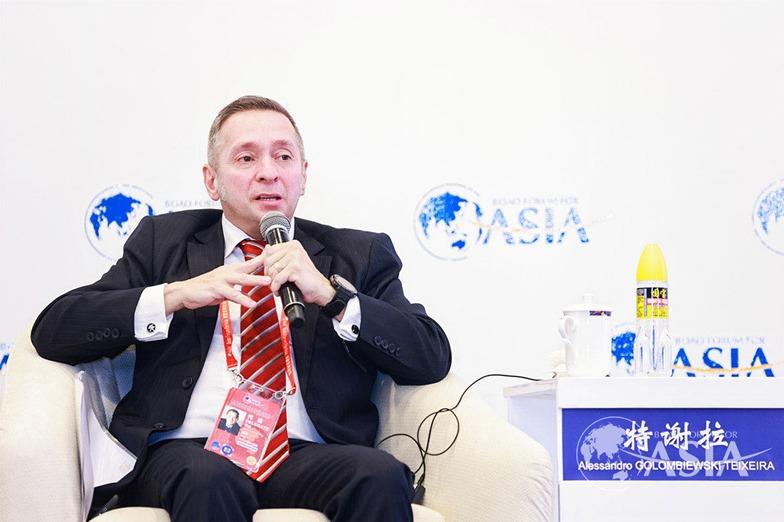 Alessandro Golombiewski Teixeira, former economic advisor to the President of Brazil, addresses a panel on March 31 at the Boao Forum for Asia Annual Conference 2023. (PHOTO PROVIDED TO CHINA DAILY)
Alessandro Golombiewski Teixeira, former economic advisor to the President of Brazil, addresses a panel on March 31 at the Boao Forum for Asia Annual Conference 2023. (PHOTO PROVIDED TO CHINA DAILY)
More cooperation and expectations are to come from Brazil and China as both countries marked this year's 50th anniversary of bilateral trade relations, according to Alessandro Golombiewski Teixeira, former economic advisor to the President of Brazil.
Golombiewski Teixeira, also Brazil's tourism minister and deputy minister of development, industry and foreign trade, told the media on March 30 that both China and Brazil can help other nations. He was attending the Boao Forum for Asia Annual Conference 2023 in Boao, Hainan province.
Brazilian President Luiz Inacio Lula da Silva recently postponed a planned trip to China for health reasons but Golombiewski Teixeira said that he hopes Brazil – which represents 40 percent of the Latin American economy – has the chance to join the Belt and Road Initiative when the visit takes place
Describing trade cooperation between Brazil and China as "strong and winning", he said the two sides enjoy complementary aspects in their trade relations. China imports soybean, beef, oil, sugar and iron ore from Brazil, with chemicals and electronic cars going the other way, he said
Both countries belong to BRICS – the group that also includes Russia, India, and South Africa. He said BRICS has the important mission of giving voice to developing countries and will have a bright future as expands into BRICS PLUS.
ALSO READ: China, Brazil agree to trade in local currencies
He noted that BRICS will strengthen multilateralism because its five members all believe in multilateral institutions, and in sharing a vision and common prosperity.
He said that some countries would like to lead the world to war, but China is not one of them. Our world needs peace and China has shown its will for that to the global community, he said. "Without peace, you don't have anything. Can you talk about poverty and inequality and development when a country is destroyed?"
Brazilian President Luiz Inacio Lula da Silva recently postponed a planned trip to China for health reasons but Golombiewski Teixeira said that he hopes Brazil – which represents 40 percent of the Latin American economy – has the chance to join the Belt and Road Initiative when the visit takes place.
"BRI is an important cooperation mechanism in the world," he said, adding that he sees it more as a platform for countries working together rather than a simple project.
Talking about China's Global Security Initiative, or GSI, Golombiewski Teixeira recalled that he was at the Boao Asia Forum last April when Chinese president announced the GSI.
To him, the GSI and the Global Development Initiative, or GDI, were "two sides of the same coin".
ALSO READ: China, Brazil reach agreement to ditch intermediary US dollar
It was very important that more companies enter the Brazilian market. He cited the car industry, where Chinese brands have changed Western-led perceptions to become popular. "Now, people are going crazy with the Chinese cars, such as BYD and Great Wall (Motors)," he said.
An important way to see the partnership is that China has different waves of investing in Brazil, he said. It started with infrastructure, then electronic companies, such as Midea and Hisense, and now it is a new stage where Chinese tech companies are in Brazil.
"Brazil is one of the largest markets for TikTok and Kuaishou in the world, which is a good thing. Also, companies like BYD, like Tencent are getting more into the Brazilian market because there are a lot of similarities with the Chinese market," he said.
Apart from Chinese e-commerce companies entering into Brazil, he said that Brazilian companies are also coming to China. Noting that the central banks of China and Brazil recently achieved an agreement to trade in their own currencies, he said financial collaboration can help countries better sail through financial crises, such as facing the impact of the banking turmoil in the US and Europe.


